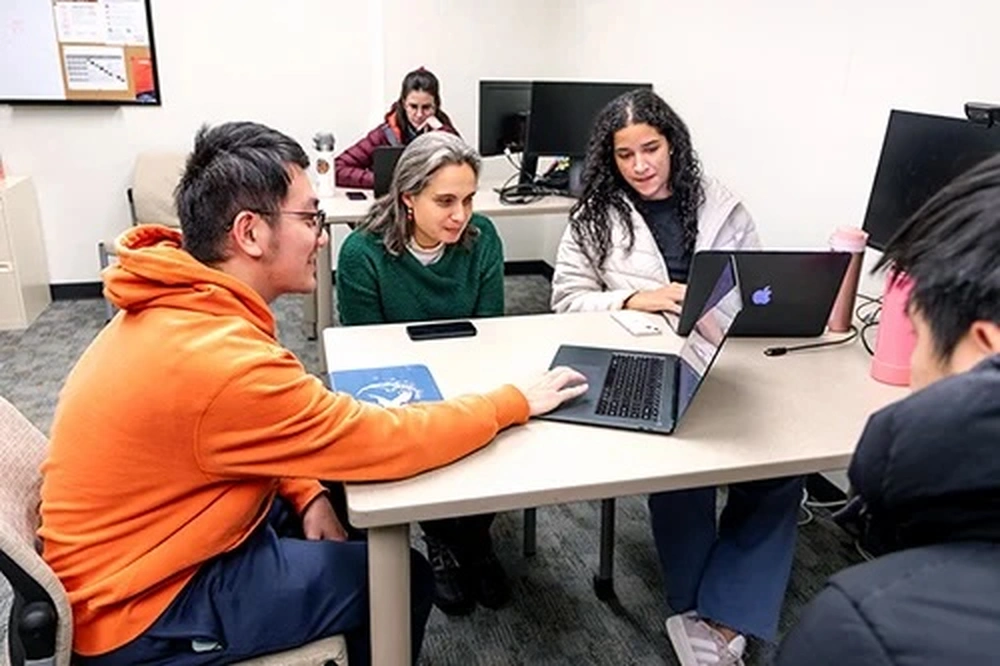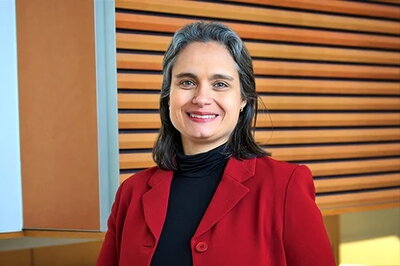
The Econometrics Data Lab in David Kinley Hall is building on a win-win concept for everyone: Give students data from ongoing research and let them crunch the numbers. The result is an experiential learning opportunity that’s allowing students to apply what they’re learning in the classroom to help resolve real-world problems.
Overseen by Daniela Alonso Fontes, a clinical assistant professor of economics, the data lab, now in its second year of operations, puts students into groups of 3-5, after which they are assigned projects based on their skill level and preference. The projects come from professors outside of the lab who need data analysis on their research numbers. Fontes has asked her colleagues from economics to kinesiology to let her students help them analyze raw data.
“This is the second term we are working, and I have wanted to be established as something that students in the economics department or departments related to it can come to,” Fontes said. “I want students to know there is this place where they can come to apply the theory that they've learned.”
Econometrics involves using mathematical methods and models to investigate relationships, effects of change, and other varying features of data. As technology develops, Fontes has seen an increase in the number of fields using econometrics, and she sees how the field is important for students across different disciplines.
For example, students Ethan Chen and Manya Jaykrishna used their lab experience to analyze data from a study being conducted in Brazil by kinesiology professor Andiara Schwingel and PhD student Ana Laura Ninomyia. The study intends to improve the health of Brazil’s aging population by teaching older adults about healthy lifestyles, and the researchers asked the Econometrics Data Lab to analyze information gathered by community health workers in Dona Francisca, Brazil.

Jaykrishna, a junior studying econometrics and quantitative economics, has been a part of the lab since its start in spring 2023. After discovering the lab during Fontes’ spotlight session last semester, Jaykrishna wanted to apply her econometrics knowledge to actual research.
“One of the things I enjoy most about the learning lab is the opportunity to collaborate with a team, which allows for exchanging ideas and learning from different perspectives,” Jaykrishna explained. “I also love the freedom to apply concepts and explore solutions through trial and error.”
Though students in the lab are analyzing data for ongoing research, Fontes still places an emphasis on learning. Students can work on projects on their own time but come to weekly meetings to discuss with other groups, get feedback and advice, and make plans for their projects to progress. The goal is for each group to be able to present their results to each other by the end of the semester.
“I think the most important things are to be curious, criticize things, and find the right questions,” Fontes said. “Usually, it's easier to answer the question than to find the right question to be asked.”
This environment has aided students like Chen, a junior majoring in econometrics, who wants to learn more about the applicability of things he is learning in his courses. He joined the econometrics lab at the same time as Jaykrishna and attributes much of his success to Fontes.
“She's very patient,” Chen said. “For example, she would give us a clear description of the project in the first meeting and introduce to us in a great deal the different methods we need to use. I remember in the last semester she introduced new concepts and the techniques to use. She is also very kind. She doesn’t make us feel pressured. I'm very grateful to the professor.”